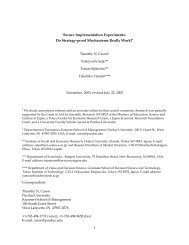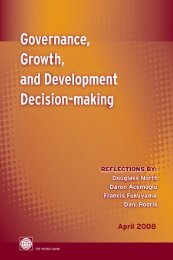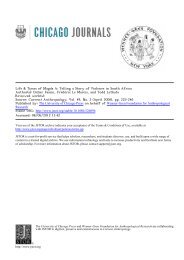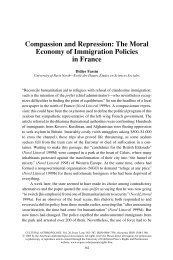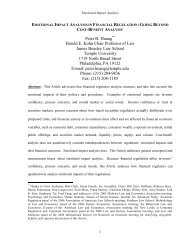The Tools of the Master Slavery and Empire in Nineteenth Century ...
The Tools of the Master Slavery and Empire in Nineteenth Century ...
The Tools of the Master Slavery and Empire in Nineteenth Century ...
Create successful ePaper yourself
Turn your PDF publications into a flip-book with our unique Google optimized e-Paper software.
<strong>The</strong> Occasional Papers <strong>of</strong> <strong>the</strong> School <strong>of</strong> Social Science are versions <strong>of</strong> talks given at <strong>the</strong><br />
School’s weekly Thursday Sem<strong>in</strong>ar. At <strong>the</strong>se sem<strong>in</strong>ars, Members present work-<strong>in</strong>-progress<br />
<strong>and</strong> <strong>the</strong>n take questions. <strong>The</strong>re is <strong>of</strong>ten lively conversation <strong>and</strong> debate, some <strong>of</strong> which will<br />
be <strong>in</strong>cluded with <strong>the</strong> papers. We have chosen papers we thought would be <strong>of</strong> <strong>in</strong>terest to a<br />
broad audience. Our aim is to capture some part <strong>of</strong> <strong>the</strong> cross-discipl<strong>in</strong>ary conversations that<br />
are <strong>the</strong> mark <strong>of</strong> <strong>the</strong> School’s programs. While members are drawn from specific discipl<strong>in</strong>es<br />
<strong>of</strong> <strong>the</strong> social sciences—anthropology, economics, sociology <strong>and</strong> political science—as well as<br />
history, philosophy, literature <strong>and</strong> law, <strong>the</strong> School encourages new approaches that arise from<br />
exposure to different forms <strong>of</strong> <strong>in</strong>terpretation. <strong>The</strong> papers <strong>in</strong> this series differ widely <strong>in</strong> <strong>the</strong>ir<br />
topics, methods, <strong>and</strong> discipl<strong>in</strong>es. Yet <strong>the</strong>y concur <strong>in</strong> a broadly humanistic attempt to underst<strong>and</strong><br />
how—<strong>and</strong> under what conditions—<strong>the</strong> concepts that order experience <strong>in</strong> different<br />
cultures <strong>and</strong> societies are produced, <strong>and</strong> how <strong>the</strong>y change.<br />
Eve Troutt Powell is Assistant Pr<strong>of</strong>essor <strong>of</strong> History at <strong>the</strong> Unviersity <strong>of</strong> Georgia. She is work<strong>in</strong>g<br />
on a manuscript tentatively entitled: “Different Shades <strong>of</strong> Colonialism: Egypt, Great<br />
Brita<strong>in</strong> <strong>and</strong> <strong>the</strong> <strong>Master</strong>y <strong>of</strong> <strong>the</strong> Sudan, 1865-1925.” <strong>The</strong> paper here is an early formulation<br />
<strong>of</strong> <strong>the</strong> problem that <strong>the</strong> book will throughly exam<strong>in</strong>e.<br />
Pr<strong>of</strong>essor Troutt Powell was a Member dur<strong>in</strong>g <strong>the</strong> year 1999-2000 (<strong>the</strong> editor regrets <strong>the</strong><br />
delay <strong>in</strong> <strong>the</strong> publication <strong>of</strong> her paper). In that year, Members addressed <strong>the</strong> <strong>the</strong>me <strong>of</strong> <strong>the</strong><br />
“universalism <strong>of</strong> human rights.” Member projects took on questions such as: “What is <strong>the</strong><br />
history <strong>of</strong> <strong>the</strong> idea that human rights are universal rights? What has been <strong>the</strong> political<br />
impact <strong>of</strong> recent human rights campaigns? What sorts <strong>of</strong> cultural (legal, religious, <strong>in</strong>ternational)<br />
conflicts have emerged <strong>in</strong> <strong>the</strong> name <strong>of</strong>, or <strong>in</strong> opposition to, calls for <strong>the</strong> enforcement<br />
<strong>of</strong> human rights? Members were urged to exam<strong>in</strong>e <strong>the</strong>se questions <strong>in</strong> concretely<br />
located examples or problems. Over <strong>the</strong> course <strong>of</strong> <strong>the</strong> year, <strong>in</strong> <strong>the</strong> comparative process <strong>of</strong><br />
discuss<strong>in</strong>g <strong>the</strong>ir local cases with one ano<strong>the</strong>r, <strong>the</strong> question came to be how a “universal” right<br />
can be determ<strong>in</strong>ed or understood when weighed with<strong>in</strong> specific historical or cultural<br />
situations—<strong>and</strong> why <strong>the</strong> stak<strong>in</strong>g <strong>of</strong> such transcendental claims may be necessary. This<br />
paper, <strong>and</strong> <strong>the</strong> longer work from which it is drawn, at first seems to exam<strong>in</strong>e <strong>the</strong> question as<br />
<strong>the</strong> history <strong>of</strong> a past era; by <strong>the</strong> end, one has a better sense <strong>of</strong> how <strong>the</strong> exam<strong>in</strong>ation <strong>of</strong><br />
“history” only better exposes <strong>the</strong> fundamentals <strong>of</strong> contemporary challenges.



